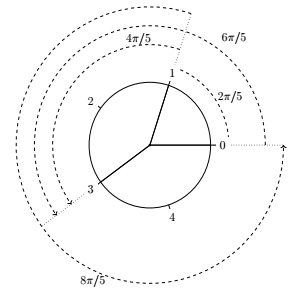12
Given some positive integer n, design a protractor with the fewest number of marks that lets you measure all angles that are an integral multiple of 2π/n (each in a single measurement).
Details
As an output, you may output a list of integers in the range 0 to n-1 (or 1 to n) that represent the position of each mark. Alternatively you can output a string/list of length n with a # at the position of each mark and a _ (underscore) where there is none. (Or two different characters if more convenient.)
Example: For n = 5 you need exactly 3 marks to be able to measure all angles 2π/5, 4π/5, 6π/5, 8π/5, 2π by setting (for example) one mark at 0, one mark at 2π/5 and one mark at 6π/5. We can encode this as a list [0,1,3] or as a string ##_#_.

Examples
Note that the outputs are not necessarily unique.
n: output:
1 [0]
2 [0,1]
3 [0,1]
4 [0,1,2]
5 [0,1,2]
6 [0,1,3]
7 [0,1,3]
8 [0,1,2,4]
9 [0,1,3,4]
10 [0,1,3,6]
11 [0,1,3,8]
20 [0,1,2,3,6,10]
PS: This is similar to the sparse ruler problem, but instead of a linear scale (with two ends) we consider a circular (angular) scale.
PPS: This script should compute one example of a set of marks for each n. Try it online!
PPPS: As @ngn pointed out, this problem is equivalent to finding a minimal difference base of a cyclic group of order n. The minimal orders are listed in http://oeis.org/A283297 and some theoretical bounds are found in https://arxiv.org/pdf/1702.02631.pdf
2Related. – Martin Ender – 2018-03-04T22:20:15.063
Borderline dupe, with exact overlap when
n = q^2 + q + 1for prime powerq. – Peter Taylor – 2018-03-05T14:22:16.280@PeterTaylor I don't see why you think it is a dupe. And can you elaborate in what way there is an "overlap"? Even though there are similarities, these are two very different problems. Furthermore this is [tag:code-golf] and challenge you linked doesn't even include the size of the program in its scoring. – flawr – 2018-03-05T16:09:18.720
They're not two very different problems. Read the OEIS link in your PPPS: the "difference set of Singer" referred to there is precisely the Golomb ruler generated by the projective field method implemented in my answer. I take the point that the scoring method is different. – Peter Taylor – 2018-03-05T17:43:16.690